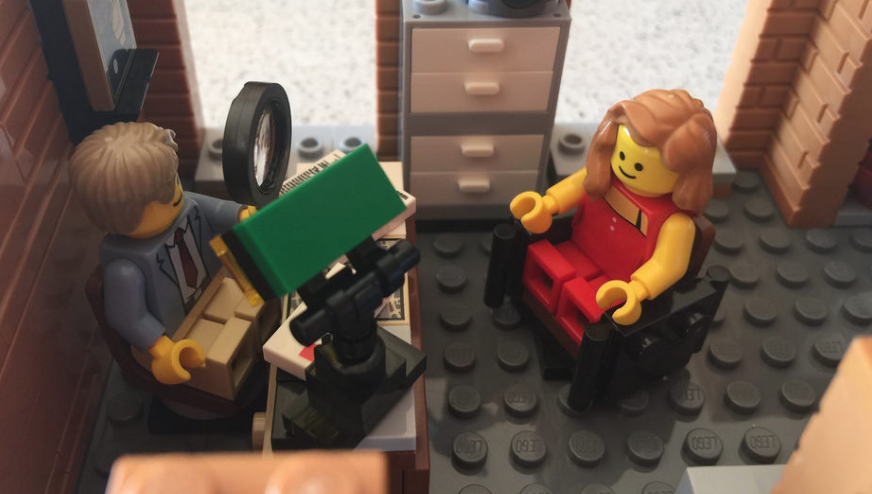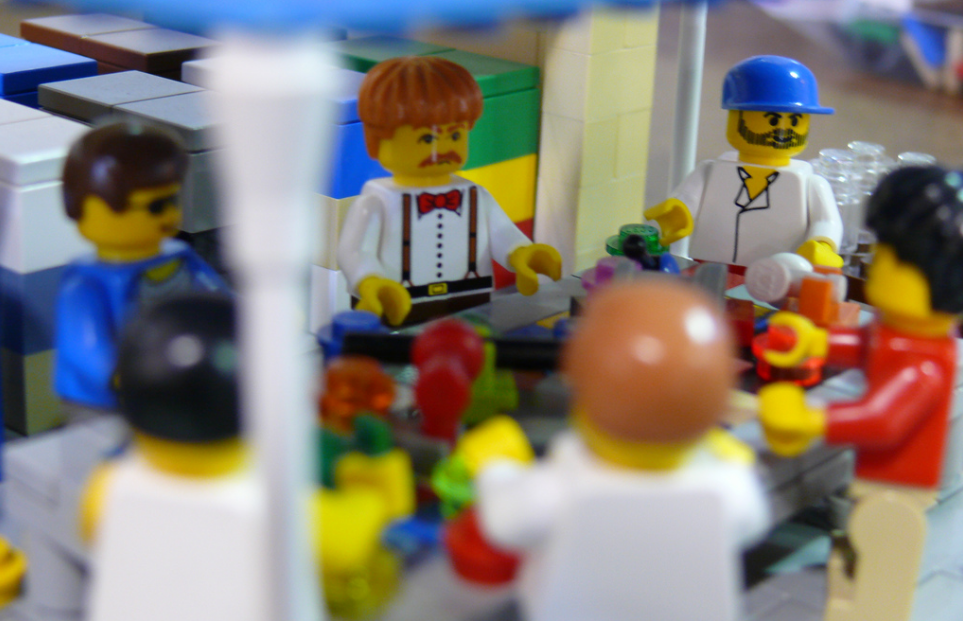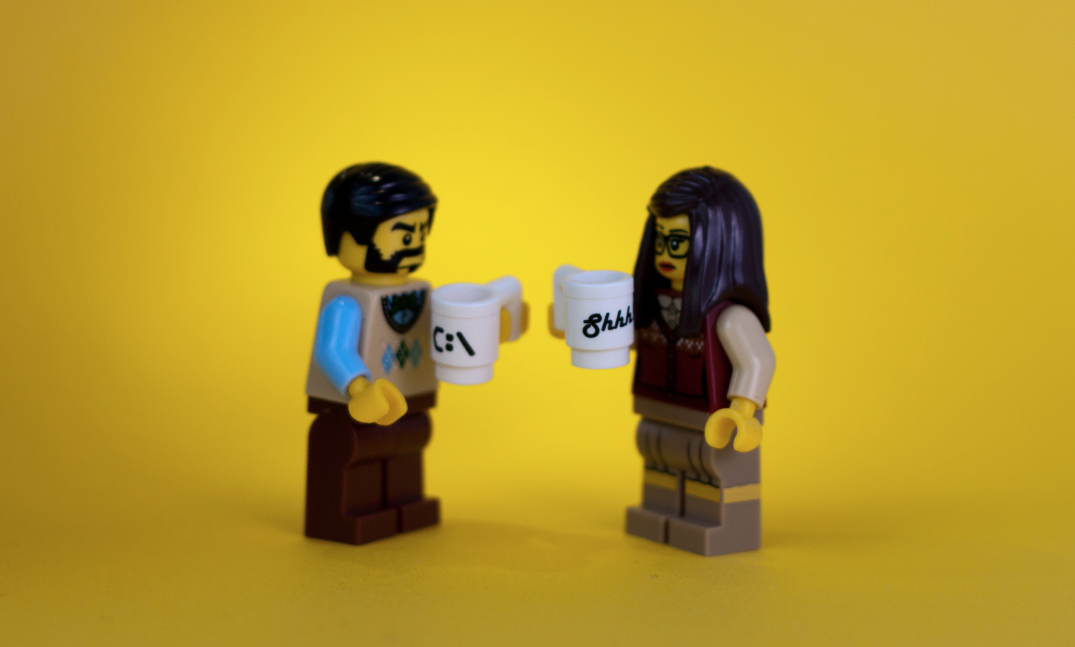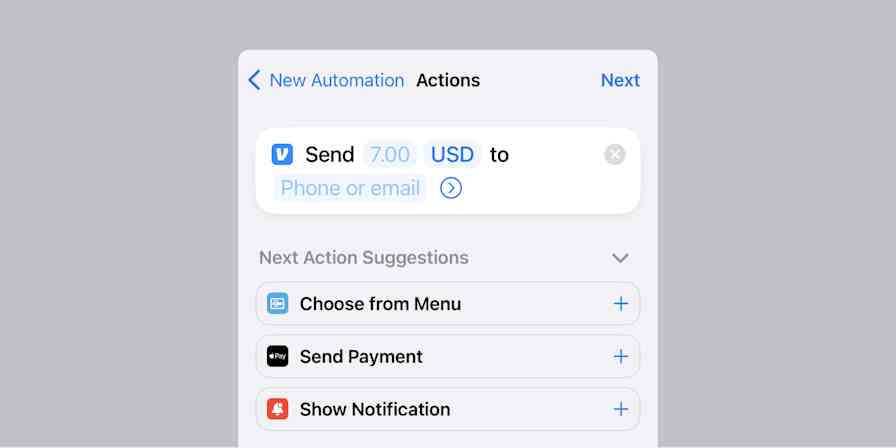There’s an episode of Seinfeld when Elaine and Jerry get stranded at a party and spend the night dodging awkward small talk. Jerry comes up with a bright idea: They’ll come up with a signal for when one of them gets stuck in a bad conversation so the other person can come bail them out.
"How about this? Chicken wing," Jerry says, flapping his left arm. "No, I got a better idea: head patting!"
Cue both Jerry and Elaine in separate, unpleasant conversations urgently patting their own heads, signaling for the other to intervene.
Small talk is the appetizer for any relationship
Debra Fine, author of The Fine Art of Small Talk
We've all experienced that fear that we'll be the boring person in a conversation or been desperate to ditch an awkward or boring discussion. Small talk can be intimidating, especially in professional situations, and some people hate small talk because it's polite conversation about unimportant topics. What should you talk about? What if you can’t think of anything to say? (There's only so much one can say about the weather or the traffic.) Worse: What if you say something awkward and the other person starts patting their head like a maniac?
Sure, making conversation with professional peers you don't yet know might seem a little scary at first, but if you do it right, you stand to build important relationships that can lead to really great career opportunities. "Small talk is the appetizer for any relationship," says Debra Fine, author of The Fine Art of Small Talk. Situations like interviews, networking events, and your first day on the job are perfect occasions to spark professional relationships.
To avoid awkward moments and converse with confidence, here are a few tips for making small talk like a pro, according to experts I spoke with on the subject.
How to make small talk…
...in a job interview

Even if you don’t end up with the job, interviews are often great chances to build your network--and refine your interviewing skills. Plus, research shows that rapport-building--through small talk--can have a big effect on your interviewer's perception of you right from the start of the interview.
Small talk usually leads the conversation as a way for both interviewer and interviewee to get a bit more comfortable. So be ready for some idle chit-chat with your interviewer as a way to break the ice and show off your charm. Maybe make a comment on the office building or, yes, even the weather.
Also, "be prepared sharing a little something about yourself that’s not on your résumé," says Elaine Swann, lifestyle and etiquette expert. "Think of something interesting that your interviewer won’t already know about you from your application materials, maybe a recent marathon you ran or vacation you took."
You should also avoid rambling, however, which can make interviews more awkward. When answering questions, "respond with detail, be concise and use numbers," Fine says.
Here’s an example:
Interview: "Why do you think you’re a good fit for this role?"
You: "I’d say there are two main reasons why I’m a good fit. Number one…and number two..."
"People love those kinds of answers," Fine says. "It keeps the responder organized and keeps them from blabbing."
...at a networking event

Walking into a room of strangers can be daunting, especially if you’re not the talkative, highly sociable type. But remember, most other people in the room probably feel the same way you do.
"Recognize that most people are nervous," says Jim Kokocki, international president of Toastmasters, a global organization devoted to communication and leadership skills development. "Walk into the and room take a minute to look around. Grab a drink and go find someone who’s standing awkwardly themselves. Say something like, ’Hello my name is Jim. What brings you to this event?’"
To avoid getting overwhelmed, Fine recommends turning networking into a task and setting small, achievable goals.
"When I walk into a coffee break at a conference, I’ll tell myself I’m going to meet one new person or three new people, whatever works for you," Fine says. "Once I do that, then I get to go grab a drink or go take a break in the lobby." Thinking about it as a task makes networking seem much more doable because you’ve set parameters.
Not feeling particularly confident? Fake it ‘til you make it. "In my experience," Kokocki says, "once you start a conversation, you won’t need to fake it for very long."
...during your first day on the job

They hired you (yay!), so clearly they like you. Of course, you still want to make a good impression on your first day and start building relationships with your new co-workers.
If your employer doesn’t already set you up with a buddy, "enlist help from someone who is familiar with everyone," Kokocki says. "Ask if someone can show you around or make some brief introductions."
If you’re looking for conversation starters, check the company’s social media accounts beforehand, Swann recommends.
"Maybe they recently had a company party, outing or team-building activity, and you can say something like ‘Hey, I noticed on your Facebook page you had pictures of skydiving as a team activity. What was that like?’" Doing a little research can provide you with some great conversation starters to learn more about learning more about your new team.
First days are bound to have a few bumps. Don’t forget to remind yourself that in six months, you’ll feel like an insider.
How to become a small talk expert

No matter the situation, these conversation tips will serve you well.
Be prepared.
"The worst time to think of something to talk about is when there’s nothing to talk about," Fine says. "Always be prepared. Never walk into an event without two to three things to talk about."
To think of things to talk about, Fine suggests capitalizing on what she calls "free information." What do you already know to be true? Examples of free information might be: "We’re at the same conference. It’s summer time. We’re in Mountain View, California," Fine says. "Knowing those things, you could ask questions like ‘What brought you to this conference?’ ‘Any plans for summer?’ ‘Are you from this part of the country, or are you just visiting?’"
Use the information you already have at your fingertips to get conversations going. Those types of open-ended questions will help you learn more about the person and give you enough information to ask some good follow-up questions.
Assume the burden.
"The key to small talk is assuming the burden of other people’s comfort," Fine says. One way to do that is to prepare really great answers to common questions people will ask you.
"Walk into any occasion with a real response to the question ‘How are you?’ Say something like "I’m tired. I got in late from a trip last night, but I finished my book club book." Or "Good, looking forward to next weekend to get some good golf in.’" When you give good, explicit responses, you’re offering up information people can use to easily continue the conversation.
When someone else is talking, remember to give verbal cues like "really?" and "mhmm" to let people know you’re listening. And really do listen. Many people, instead of listening, spend their time while the other person is talking thinking about their own response. Try not to do that. Stay on track mentally and don’t tune out.
For conversation starters, Fine recommends open-ended questions like "What keeps you busy outside of work?" "What was the highlight of your weekend?" or "What projects are you working on right now?". Steer clear of asking whether someone is married or has kids, which can become awkward fast if someone is, say, going through a divorce. If you’re chatting with someone you’ve met before, try asking "What’s new in your life since last time we talked?"
You don’t always have to avoid politics and religion.
Most people will still prefer to steer clear of hot-button topics, but if you approach them the right way, they don’t have to be completely off the table.
The key, says Fine, is to approach the topic genuinely interested in what others think. If you state an opinion about politics, "ask the person across from you what they think. It’s OK to be opposed to something. I want to hear your opinion, but only go there if you’re not trying to convince someone of your opinion being right."
That said, in some situations--conversations with clients or a job interview--highly controversial topics could escalate quickly. The trouble probably wouldn't be worth any benefits of bringing a controversial subject up.
If things do get uncomfortable, you have options.
If someone brings up a topic that creates a divide and you want to save the conversation, "the best thing to do is allow them to finish their sentence," says Swann. "Acknowledge what they said with something neutral like ‘That’s really interesting,’ or ‘I guess we’ll have to see how it all plays out. ‘Then shift to a new topic."
If you’re uncomfortable and want to move on from a conversation, do it gracefully, Kokocki says. "Simply say something like ‘It’s been great to connect with you. I’m going to mingle a little more.’" The Muse has a few other great ideas for exiting a conversation gracefully.
Just make sure you don’t lie to get out of a discussion, Swann says. "Don’t say you have to leave the event and then go start a conversation with someone else."
Don’t focus on yourself.
Fine says one great way to kill a conversation is to talk too much about yourself.
"If you talk more than four minutes about yourself, stop, you’re done," she says. "Your answers should be a sentence or two, not a narrative."
Kokocki says putting the focus on your conversation partners will help you avoid awkward territory. "In most awkward conversations, we’re so centered on ourselves and how we’re feeling. If you can become skilled in making other people feel good about themselves, asking them questions and listening to them, that will serve you very well."
Questions are also a great way to keep a conversation going and get better feedback. For example, a new acquaintance just told you they went to Hawaii with their kids this year. That opens up lots of room for exploring: What activities did they do? What was the food like? How old are the kids? And it opens up ways for you to engage in the conversation too: I've never surfed, but I like boats and islands...and so on.
Remember everyone starts somewhere.
Even the most confident conversationalists probably didn’t start out with the gift of gab. Fine used to be an engineer who thought small talk was "a waste of saliva." But once she saw the positive rewards of making good conversation, she became committed to improving.
Kokocki was a computer programmer in the 1980s when he realized he was missing crucial soft skills.
"Two engineers came to my desk one day and said that I was a pretty smart guy but that I didn’t say anything in meetings," he says. "So I joined Toastmasters. I recognized it was something I needed, but I started very awkwardly and reluctantly."
Practice, practice, practice.
How did Fine and Kokocki become experts? They practiced.
As with any skill, the more you practice, the better you’ll be. Start going to more networking events to practice your conversation skills, or chat up coworkers you don’t normally talk with. Challenge yourself to talk to one stranger a day. Try using habit apps like Way of Life, Balanced or Coach.me to keep track of your progress.
Related: Learn how to build better habits by starting small and rewarding yourself or using gamification
You can also look into joining your local Toastmasters club, which has a structured program that takes about a year and a half to complete.
Who needs a distress signal? With a little practice and some preparation, you can avoid awkward situations and confidently start (or gracefully exit) any conversation. Making great small talk could very well be the key to acing your next interview, connecting with new coworkers, or forming valuable business relationships. It'll help with your personal life too--any time you find yourself at a cocktail party or on a first date. Once you've mastered the dreaded small talk, you'll be able to get into deeper, or at least more productive, conversations.
Title photo by Innovation Union via Flickr. LEGO job interview image by Sarah_Ackerman. LEGO networking photo by Bill Ward. LEGO job photo by Sonny Abesamis. LEGO talking photo by The Laddie.





